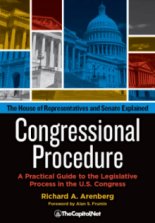Function / Functional Classification (CongressionalGlossary.com)
From the Congressional Glossary – Including Legislative and Budget Terms Function / Functional Classification photo credit: quinn.anya Categories of spending established for accounting purposes to keep track of specific expenditures. Each account is placed in the single function (such as national defense, agriculture, health, etc.) that best represents its major purpose, regardless of the agency … Read more




